.
Celebrations
.
1.- Introduction
to lesson
In today’s
lesson, we are going to talk about celebrations. We are going to look
at one particular festival called ‘Las Fallas’ which takes
place in Valencia every year. We will then look at a number of phrasal
verbs.
1.1.- Look
at the pictures below and decide which celebrations are shown in each
picture. If you don’t recognise the celebration, describe exactly
what you see in each picture.
.
.
2.-
Your turn…
Answer the
following questions out loud giving as much detail as possible.
Do you
celebrate any of the festivals shown above? Are they common in your
country?
Are there
any popular festivals in your country which aren’t shown above?
Describe one in detail.
.
3.- Pre-Listening
Speaking Task
Before listening
to the description of a popular festival called ‘Las Fallas’
which takes place each year in Valencia, I would like you to guess what
the festival is about by using the following words which have been taken
from the extract:
March
Valencia
Fireworks
Noise
Party
One week
Alive
Lifelike statues
Fire
Firecrackers
If you do
not understand the meaning of some of the words, look them up in your
dictionary.
.

.
4.- Vocabulary
Before you
listen to the description of the popular festival, learn the following
words:
Fireworks
Preparations
Bonfire
Firecrackers
Parade
Procession
Candelabra
Lifelike
.
5.- Listening
5.1.- Listen
to a journalist give a detailed description of the festival. Is it how
you imagined?
.
5.2.- Now
listen again and answer the following questions:
(to
see the answer click on the table; double click return)
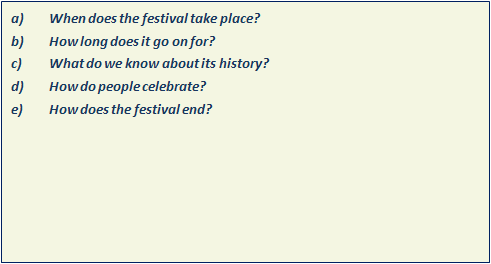
.
6.- Your
turn…
Discuss.
Would
you like to experience this festival? Why?
.
7.- Language
Focus: Phrasal Verbs
There are
two types of phrasal verbs that you hear in the listening: intransitive
(verb with no object) and transitive (verb that takes an object) phrasal
verbs.
.
7.1.- Look
at the following phrasal verbs which have been taken from the tapescript
and indicate if the phrasal verbs are transitive or intransitive.
(to
see the answer click on the table; double click return)
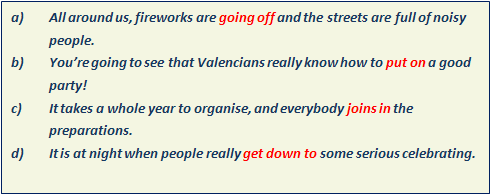
.
7.2.- Check your
understanding
What is
a phrasal verb?
Look at
the tapescript and underline all of the phrasal verbs.
(to
see the answer click on the table; double click return)
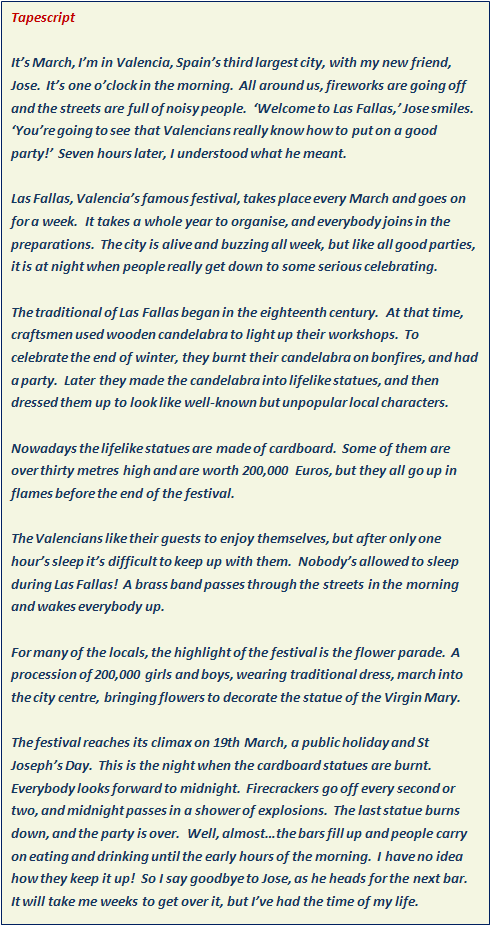
.
8.- Phrasal
Verbs: Meaning
Most phrasal
verbs have a non phrasal meaning. For example:
To
go off = to explode
The following
sentences have the same meaning:
The bomb
went off and luckily nobody was injured.
The bomb exploded and luckily nobody was injured.
.
8.1.-
Match each of the following phrasal verbs with its literal meaning.
If you are uncertain, look at the tapescript and see the phrasal verb
in context.
(to
see the answer click on the table; double click return)
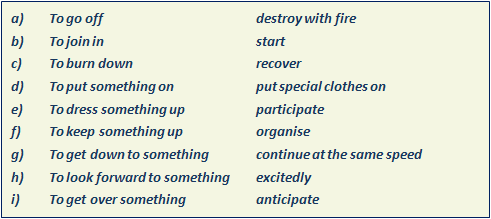
.
9.- Controlled Practice
Fill in
the gaps with the appropriate phrasal verb from the list below. Change
the tense of the phrasal verb accordingly.
Go off / Join in / Burn down / Put something on / Dress something up
Keep something up / Get down to something
Look forward to something / Get over something
(to
see the answer click on the table; double click return)
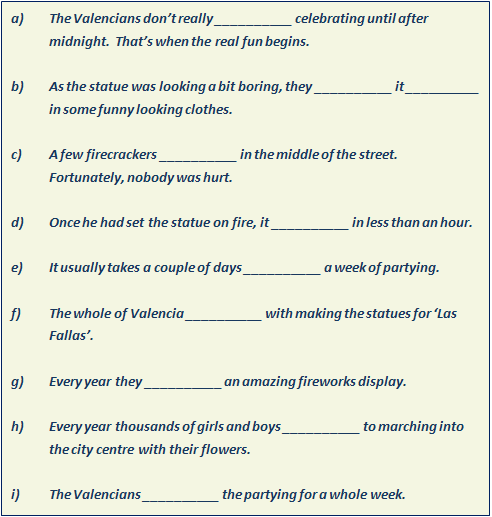
.
10.- Freer
Practice
Give a spoken
definition of the following phrasal verbs. Give examples of the phrasal
verbs in context.
- To join
in
- To burn down
- To get over something
- To dress something up
.
|
